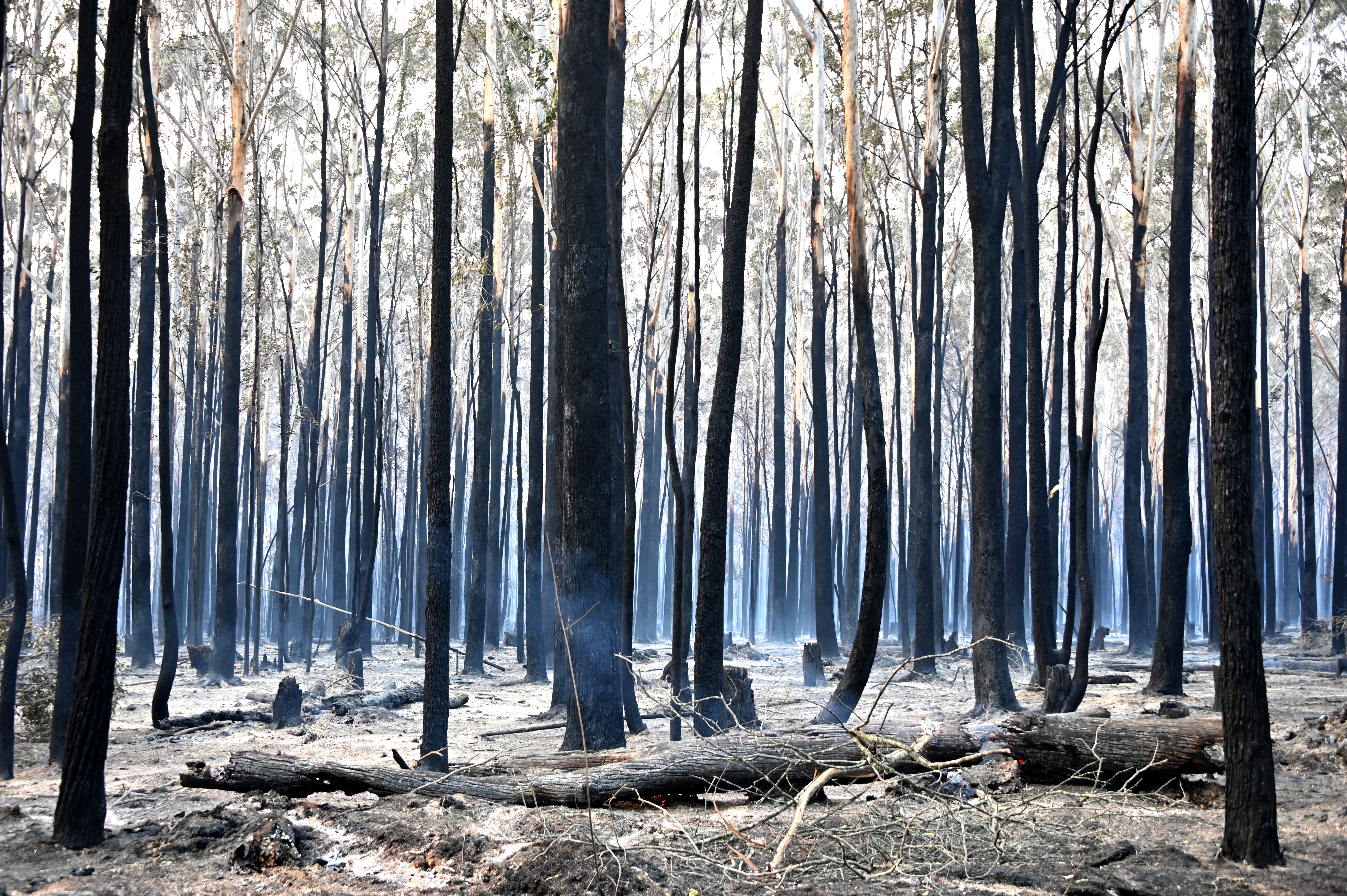
Trees are burned black after a bushfire in Old Bar, 350km north of Sydney on November 10, 2019. – Firefighters in eastern Australia were on November 10, 2019 assessing damage from ferocious bushfires that have devastated communities and rushing to prepare for “bad, if not worse” conditions expected to flare in the coming days. (Photo by PETER PARKS / AFP)
WINMALEE, Australia — Thousands of firefighters fanned out across eastern Australia Tuesday as gale-force winds, scorching temperatures and tinder-dry bushland brought “catastrophic” fire conditions.
Dozens of bushfires were already burning out of control as temperatures were expected to climb toward 40 degrees Celsius (104 Fahrenheit) and winds were forecast to top 60 kilometers (40 miles) per hour in parts of New South Wales.
Firefighters warned the threat to a vast region surrounding Sydney was “off the scale” after days of blazes that have killed three people and destroyed more than 150 homes.
New South Wales Rural Fire Service Commissioner Shane Fitzsimmons warned that in current conditions, “if a fire starts and takes hold… we are not going to stop it.”
“We have already got significant fires burning in the north coast of New South Wales. A number of those fires are exceeding 100,000 hectares alone. You’re talking about a 1,000-kilometre fire perimeter.”
West-to-east winds threatened to spread existing blazes from drought-stricken bushland to population centers on the coast.
Up to 600 schools were closed, as well as many national parks, a total fire ban was introduced and residents in several areas were told to consider getting out.
The police and military were helping firefighters with logistics and running water-dropping sorties using more than 80 aircraft.
“Now is the time to exercise those decisions to leave, leave early and go to safer locations,” said Fitzsimmons.
In the small northern town of Taree, dozens of people moved to a showground that has become a makeshift evacuation center.
Fifty-nine-year-old Caroline Watson arrived last night with her husband and their dog.
“The fires are just rife. They are absolutely everywhere” she told AFP. “They didn’t ask us to get out, but we figured it was coming.”
Fleeing by night
In the Blue Mountains on the outskirts of Sydney, veteran Winmalee firefighter Alan Gardiner said locals were “terrified and on edge.”
The town still bears the scars of a 2013 blaze that destroyed 200 homes, and residents are acutely aware that with few roads in and out of the mountains, a decision to leave too late can be fatal.
Efforts to burn fuel in a controlled way have been limited by months of drought-like conditions that made it too dangerous.
But Gardiner hopes “it’s going to be a very quiet day. I’m hoping to get very bored. If there is a fire, it’s going to be catastrophic.”
To the east in Sydney, the authorities do not expect the city’s four-plus million people to be under direct threat, but a health warning was issued as a cloak of smoke haze drifted into the city.
Australia’s deadly blazes in the last week have already spread acrid smoke as far away as New Caledonia.
Sue Johnson, who lives in Sydney’s north, helped move horses from fire-risk areas in outer Sydney to safer ground.
“I brought two horses down in the middle of the night,” she said, adding that she cut down vegetation around her home and was ready to fill her gutters with water.
“Hopefully none of this will be necessary,” she said, but people in the local community are “scared, very scared” of the fire hitting their community.
This bushfire season is in its infancy but is already on track to be one Australia’s worst on record.
In New South Wales alone one million hectares — roughly the area of Jamaica — have already burned, three times more than the whole of the last season. /muf